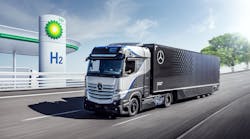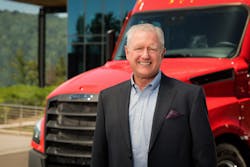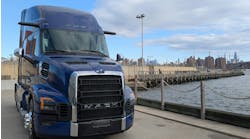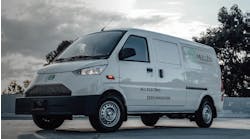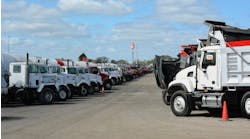While battery-powered trucks continue to garner headlines, hydrogen fuel-cell technology likely will be a “better solution” for U.S. over-the-road fleets in the coming decades, suggested John O’Leary, president and CEO of Daimler Trucks North America.
“A lot of fleets, as they look at battery-electric technology, fully understand that the physics would preclude a battery from having a 1,000-mile range—and when you're driving coast to coast, that's a problem,” O’Leary said. “Hydrogen takes that range anxiety that you have with battery-electric [trucks] off the table. The further your routes get, the more you start migrating to hydrogen in a lot of people's models.”
O’Leary spoke to North American trade journalists via video conference from Stuttgart, Germany, where he participated in Capital Market Day for DNTA parent Daimler Truck on Thursday. The world’s largest truck maker, a recent spinoff of Daimler, intends to offer stock on the Frankfurt exchange beginning Dec. 10 and is expected to qualify for the DAX—the group of Germany’s most valuable listed companies—in the first quarter of 2022.
Another potential advantage driving the adoption of hydrogen fuel cell technology is the fueling infrastructure, which “scales a lot easier and a lot less expensively” than does the charging infrastructure required for battery-electric vehicles, especially for heavy-duty trucks, O’Leary suggested.
But the U.S. is 18 to 24 months behind Europe “in terms of the conversation and awareness” of hydrogen as a viable technology for powering vehicles, O’Leary noted.
Indeed, earlier this week Daimler Truck and TotalEnergies signed an agreement to “kickstart” the development of ecosystems for heavy-duty trucks running on hydrogen. TotalEnergies hopes to operate up to 150 hydrogen refueling stations in Germany, the Netherlands, Belgium, Luxemburg, and France by 2030, while Daimler Truck will supply the hydrogen-powered fuel-cell vehicles. Daimler Truck also has a similar agreement with BP in the United Kingdom.
And earlier this year, Daimler Truck and Volvo Group completed launched their joint fuel-cell company, Cellcentric.
Still, O’Leary emphasized that DTNA is “not going to zero diesel engines anytime soon,” even as the Daimler has targeted 2039 for being carbon-neutral. For the U.S., Canada, Europe, and Japan, diesel engines “will typically be outlawed by the government,” O’Leary noted.
“2039 is a long ways away, so between now and then we are going to continue to build diesel engines,” he said. “But as the emissions regulations dictate more electric and more hydrogen going forward, we need to have an answer. A lot of people try to make it an either/or thing, but it's not. We'll have both [diesel and electric].”
Vocational market, supply chain
In other discussion, O’Leary explained that DTNA, whose Freightliner brand has led on-highway Class 8 sales for years, is targeting growth in the vocational segment—a segment set to surge with the new U.S. infrastructure funding plan.
“Even though we'd always had offerings in the vocational space, we pretty much had our lunch handed to us by competitors—and that’s not good enough,” he said, adding that DTNA has introduced Western Star 49X and 47X models to better compete for market share. “Share isn't the underlying goal for us, but certainly it's a nice descriptor of how well you're doing as a business. So for us, that aspect is really bright going forward.”
As to supply chain challenges, O’Leary conceded that “it’s been tough,” and DTNA procurement teams have been making “yeoman efforts” in the global search for computer chips. Indeed, if not for the chip shortage, 2020 and 2021 would have been “tremendous” for the industry due to fleet demand.
“We've had good weeks and we've had bad weeks in terms of being able to meet our [production] count,” he said. “It's not going to get perceptibly better in Q4 but, certainly, as we get into next year, we do think that things will start improving. It’s a great unknown right now.”
So, as to delivery schedules, all DTNA can tell customers is “the absolute truth that we know on that particular day,” O’Leary explained. He added that deliveries have varied, depending on products: A Cascadia sleeper cab typically needs more chips than a vocational truck, for example.
Similarly, recently announced price increases are not to “fatten up our margins,” but just to cover increased costs, O’Leary pointed out.
Organizational impact
Globally, DTNA has been assigned a goal of 12% Return of Sales by 2025, the highest target among the Daimler Truck geographic markets. The worldwide goal for Daimler Trucks in 2025 is 10% RoS, compared to an expected 6%-8% for 2021, according to the Capital Market Day presentation.
But DTNA customers shouldn’t expect significant changes in the wake of the corporate organizational changes in Stuttgart.
“The customer won't notice anything different, in a negative sense,” O’Leary said. “What they will notice going forward is the things that we're doing on a global scale, such as fuel-cell development, battery-electric development—all the technology that we're working on that will be developed at a much higher level and with our own expertise, and then using the cost base of our global manufacturing output.
“So what they will ultimately see is better technology at a lower price over time.”
